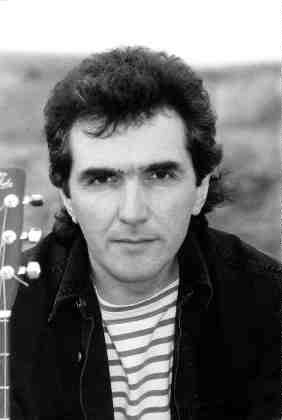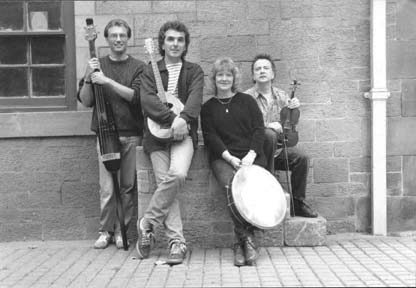Jez Lowe: Raising The Standards
by Jan Vanderhorst
April 2000
| Consider
for a moment the life of a singer-songwriter. You
spend your days developing your craft through hours
and hours of writing, editing, rewriting, starting
all over again from scratch and maybe even giving up
entirely on a song, because it's just not working
out. What you're trying to find is the right turn of
phrase that will capture the image you want to
convey. What you're trying to accomplish is a
connection with the listener, some common feeling
which they can call their own. If you're successful
you might get 10 to 12 really good songs a year. Now consider what happened to English singer-songwriter Jez Lowe. He was given 50 minutes to write a song for a BBC News segment covering the closing of the last coal mines in England. He pulls it off in time and almost instantly "These Coal Town Days" becomes one of his most beloved songs. "I thought I was going to (perform) it that one time and that was it", he says, "but it's been recorded by lots of other people. It's become a bit of a folk music standard all over the country. It's a bit ironic you know, you spend so much time on some of the songs and then a little quick job like that is the one that makes more of a splash." |
 English singer-songwriter Jez Lowe |
While the speed at which Jez was able to write "These Coal Town Days" was unusual, the speed at which it was embraced by the English folk club community was not. Many of Jez's songs have become folk club standards over the years, to the point where some people have thought "Durham Gaol", You Can't Take It With You", "Soda Man" and other songs are traditional.
"Someone reviewed a concert I did at a folk festival", Jez recalls, "and they said I just got up and did a set of folk standards and there was nothing much original there. What they didn't realize was the 'standards' were the ones I'd actually written. That's happened all along. People have picked up on the songs as part of the folk tradition and they don't realize where they come from. I found very, very often in Canada, the States and Australia even, I get there but the songs are there long before I am. So that's quite bizarre!"
Bizarre though it may be, it's heartening for Jez to know his songs are being accepted so far from home.
"The songs deal mainly with a very small part of Northern England, and yet they seem to be applied and taken up by people all over the world. That never ceases to amaze me. I think if I tried to write for a wider audience it wouldn't work as well. Even getting new experiences from different parts of the world, it would be wrong for me to not look at things from the perspective that I always have. So that's what I try to do. It keeps my integrity and keeps me true to myself."
The successful career Jez has established has not totally been a solitary struggle. Since 1990 he has toured for part of each year with The Bad Pennies, a trio of equally talented solo performers. Billy Surgeoner is the senior member of the group, having started the group with his brother Bob and Bev Sanders. Judy Dinning joined the Bad Pennies in 1996 and splits her time with the "Pennies" and the all-female folk group The Lucky Bags. This group has two recordings to their credit, "Food For Thought" and "Delight In Disorder". The newest member of the Bad Pennies is Simon Howarth, who joined in 1998. He has one solo recording out so far, entitled "Coast To Coast". The partnership with the Bad Pennies has resulted in one of Jez's most critically-acclaimed recordings "The Parish Notices", released in 1998. Jez grew up in the Durham area of Northeastern England, absorbing the musical tradition around him.
| "There's
a tradition of songs and tunes (there) that goes back
hundreds of years, plus there are musicians and
songwriters and composers from that part of the
country. Plus the people are very interesting, a lot
of heavy industry used to be up there, coal mining,
ship building and stuff. So it's quite a source of
inspiration for me." That inspiration doesn't seem to be drying up. As the Artist-In-Residence for Durham, Jez was commissioned in 1994 to write |
 Jez Lowe with The Bad Pennies |
and produce the song "Banners" which was used to mark the closing of the last mines in the area and the last Miners' Gala, long a tradition in the region. In 1997 the BBC commissioned him to write and present a radio series on the music of Northeast England which was called "A Song For Geordie".
The year 2000 finds Jez working on a project for the East Durham Development Council. The 20-minute piece of music is to honour the opening of a coastline nature reserve.
"It's quite a big deal! They've reclaimed about an 8-mile stretch of coast, which was previously covered in waste from the mines and from the steel work. They've reclaimed it and tried to turn it back to how it used to be. (So) they're going to have a big sound and light kind of experience. I've been asked to provide the music for that. It's going to be quite an exciting event. The idea is to bring in school children and local musicians; not just folk musicians, but all kinds of musicians, it's not going to be a project specific to me. It's a bit of a daunting prospect."
It would seem though to just be part of the territory for someone who can create a folk music standard in less than an hour.
If you'd like to know more about Jez Lowe and the Bad Pennies, go to: www.JezLowe.com
The website address for The Lucky Bags is: www.haley.demon.co.uk/LuckyBags
Simon Haworth's website address is: http://www.morpeth61.freeserve.co.uk
Jan Vanderhorst can be reached at jan@hyperpeople.com
